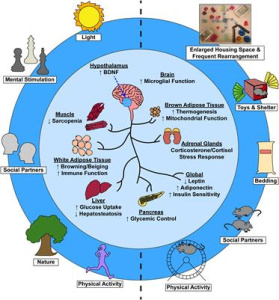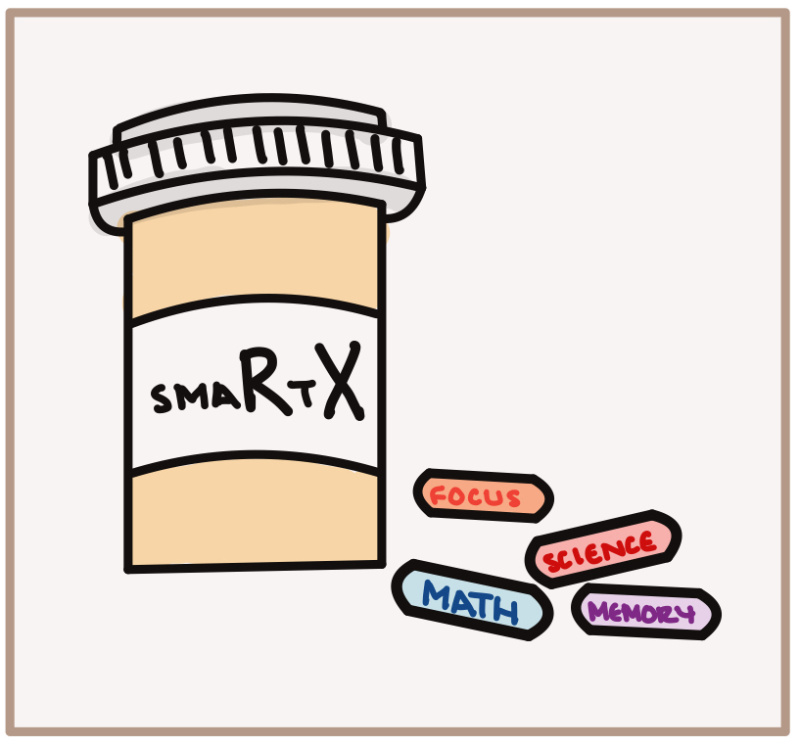Artstract by Kailee Vigen
Imagine a world where there is a magic pill you could buy at Target or Walmart that helps you focus, boosts your memory, and increases your intelligence.
Well, there is no need to imagine this world, because you are living in it! These “magic pills” are called nootropics. But, just how much do these pills or supplements actually work?
Nootropics and Intellectual Disability
Current research suggests that a combination of environmental enrichment and nootropics could be a course of treatment for various intellectual disorders (ID’s) by improving memory and learning. Someone living with ID means they have decreased ability to learn, live independently, and problem solve. Common ID’s include:
- ADHD
- Autism
- Down Syndrome
- Fragile X Syndrome
- Tourette’s Syndrome
- Muscular Dystrophy
- Cerebral Palsy
- Vision and hearing impairments
What is environmental enrichment?

Greater environmental enrichment correlates with greater quality of life. It involves stimulating the brain through social and physical surroundings. Basically, enrichment involves things that add value to our lives and make us happy, and this can come in numerous forms: reading, traveling, exercising, buying a new car, doing an activity you enjoy, etc. These things paired with a nootropic can increase cognitive function for those with ID.
One nootropic of interest are ampakines which are a positive allosteric modulator of the AMPA receptor, an inhibitory receptor. Ampakines bind to this receptor and modulate it in such a way that slows the receptor deactivation and desensitization, prolonging its openness and increasing the amplitude of excitation. Ampakines facilitate learning and memory formation, and prevent neurodegeneration.
Another nootropic is Ras-ERK inhibitor. In ID, the Ras-ERK pathway is overactive causing excessive dendrite formation. These inhibitors improve attention span and working memory deficits.
Over-the-Counter Nootropics… the moment of truth
So, can you become more intelligent from the “brain enhancing” pills and supplements you can buy at the store? The answer is … no.

According to Barry Gordon, MD, it is still unsure whether nootropics work and are safe to take regularly. Cognitive pathways are so complicated and much is still unknown, so it does not make much sense for nootropics to suddenly improve these unknown pathways of cognition. If nootropics do work for people, that is due to the placebo effect. Health experts suggest only take prescription nootropics if you have a condition that deems their use as necessary. Nootropics generally do not work and are not needed for healthy individuals.
However, if you wish to increase focus and learning, there are things that act as a natural nootropic! Sleeping, healthy eating, exercise, managing stress, and even consuming berries and dark chocolate can play a large role in improving overall cognitive function. One nootropic majority of people consume is caffeine! Caffeine is a stimulant that can increase thinking skills, and it increases acetylcholine release which is used for short-term memory formation and learning. As if you needed another reason to crack open a can of Diet Coke or drink even more coffee today!
References
Brody, B. (2022). “What Are Nootropics?” WebMD. https://www.webmd.com/vitamins-and-supplements/features/nootropics-smart-drugs-overview.
More, L.; Lauterborn, J. C.; Papaleo, F.; Brambilla R. (2020). Enhancing cognition through pharmacological and environmental interventions: examples from preclinical models of neurodevelopmental disorders. Neuroscience and Biobehavioral Reviews, Vol. 110, 28-45. https://doi.org/10.1016/j.neubiorev.2019.02.003.
Singleton, W. (2010). “Human Enrichment: Can I Get Just a Little?” The Enrichment Record. http://enrichmentrecord.com/human-enrichment-can-i-get-just-a-little/#:~:text=The%20birth%20of%20a%20baby,and%20make%20us%20feel%20good.
“What Is an Intellectual or Developmental Disability?” The Arc of Larimer County. https://thearcoflarimercounty.org/about-us/what-is-an-intellectual-or-developmental-disability/.
